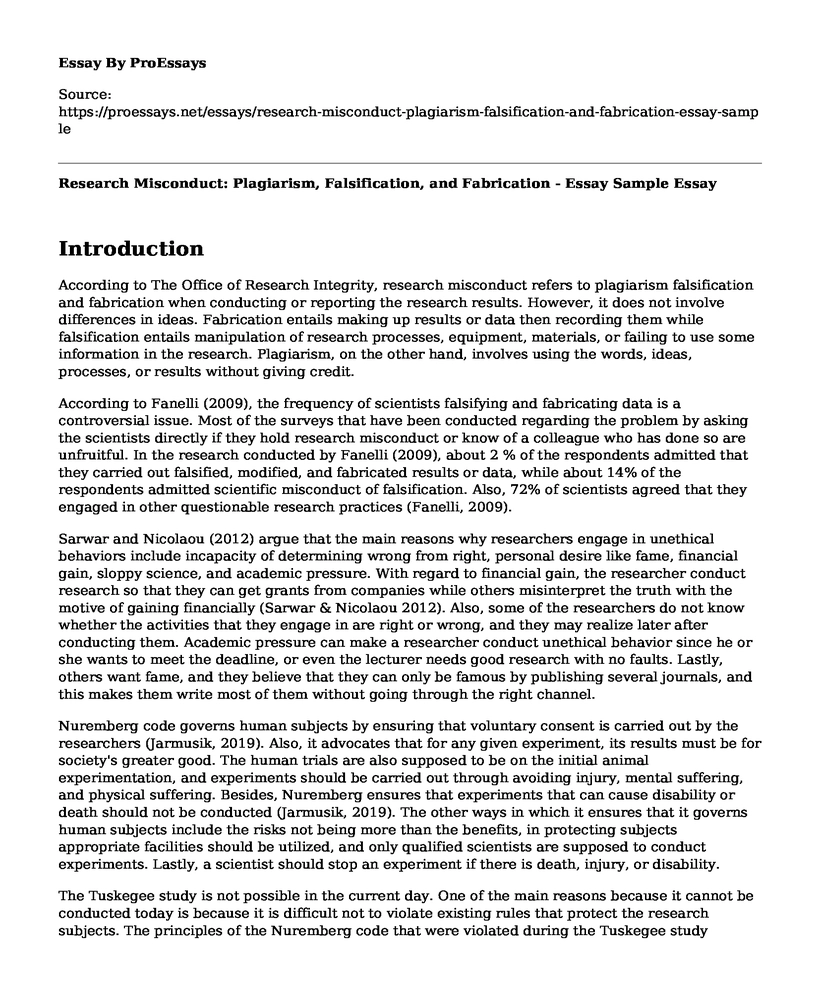Introduction
According to The Office of Research Integrity, research misconduct refers to plagiarism falsification and fabrication when conducting or reporting the research results. However, it does not involve differences in ideas. Fabrication entails making up results or data then recording them while falsification entails manipulation of research processes, equipment, materials, or failing to use some information in the research. Plagiarism, on the other hand, involves using the words, ideas, processes, or results without giving credit.
According to Fanelli (2009), the frequency of scientists falsifying and fabricating data is a controversial issue. Most of the surveys that have been conducted regarding the problem by asking the scientists directly if they hold research misconduct or know of a colleague who has done so are unfruitful. In the research conducted by Fanelli (2009), about 2 % of the respondents admitted that they carried out falsified, modified, and fabricated results or data, while about 14% of the respondents admitted scientific misconduct of falsification. Also, 72% of scientists agreed that they engaged in other questionable research practices (Fanelli, 2009).
Sarwar and Nicolaou (2012) argue that the main reasons why researchers engage in unethical behaviors include incapacity of determining wrong from right, personal desire like fame, financial gain, sloppy science, and academic pressure. With regard to financial gain, the researcher conduct research so that they can get grants from companies while others misinterpret the truth with the motive of gaining financially (Sarwar & Nicolaou 2012). Also, some of the researchers do not know whether the activities that they engage in are right or wrong, and they may realize later after conducting them. Academic pressure can make a researcher conduct unethical behavior since he or she wants to meet the deadline, or even the lecturer needs good research with no faults. Lastly, others want fame, and they believe that they can only be famous by publishing several journals, and this makes them write most of them without going through the right channel.
Nuremberg code governs human subjects by ensuring that voluntary consent is carried out by the researchers (Jarmusik, 2019). Also, it advocates that for any given experiment, its results must be for society's greater good. The human trials are also supposed to be on the initial animal experimentation, and experiments should be carried out through avoiding injury, mental suffering, and physical suffering. Besides, Nuremberg ensures that experiments that can cause disability or death should not be conducted (Jarmusik, 2019). The other ways in which it ensures that it governs human subjects include the risks not being more than the benefits, in protecting subjects appropriate facilities should be utilized, and only qualified scientists are supposed to conduct experiments. Lastly, a scientist should stop an experiment if there is death, injury, or disability.
The Tuskegee study is not possible in the current day. One of the main reasons because it cannot be conducted today is because it is difficult not to violate existing rules that protect the research subjects. The principles of the Nuremberg code that were violated during the Tuskegee study include the fact that the voluntary consent of the people on whom the research is conducted was not obtained (Ogungbure, 2011). The other principle that the study did not adhere to is that the experiments were not firm carried out by animal experimentation. Lastly, the experiment was not conducted in necessary medical management, expertise, and protection (Ogungbure, 2011).
References
Fanelli, D. (2009). How many scientists fabricate and falsify research? A systematic review and meta-analysis of survey data. PloS one, 4(5), e5738.
Jarmusik, N. (2019, April 9). The Nuremberg Code and Its Impact On Clinical Research. Imarc. https://www.imarcresearch.com/blog/bid/359393/nuremberg-code-1947
Ogungbure, A. A. (2011). The Tuskegee syphilis study: Some ethical reflections. Thought and Practice, 3(2), 75-92.
Sarwar, U., & Nicolaou, M. (2012). Fraud and deceit in medical research. Journal of research in medical sciences: the official journal of Isfahan University of Medical Sciences, 17(11), 1077.
The Office of Research Integrity. (n.d.). Definition of Research Misconduct. Retrieved from https://ori.hhs.gov/definition-misconduct
Cite this page
Research Misconduct: Plagiarism, Falsification, and Fabrication - Essay Sample. (2023, Jul 19). Retrieved from https://proessays.net/essays/research-misconduct-plagiarism-falsification-and-fabrication-essay-sample
If you are the original author of this essay and no longer wish to have it published on the ProEssays website, please click below to request its removal:
- Social Research Methods Essay
- Obtaining Credible Sources on Functional Foods From the Internet Paper Example
- What Is a SWOT Analysis?
- Qualitative and Quantitative Research in Strategic Communication
- Criticism and Analysis of Hamlet
- Essay Example on Inquiry Discussion: Two Perspectives for Analytical Analysis
- Free Report Sample on Strategic Planning: Internal & External Environmental Analysis







